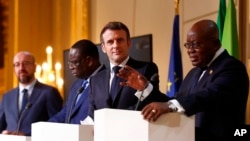President Emmanuel Macron said Thursday that France will withdraw its troops from Mali nine years after it first intervened to drive Islamic extremists from power but intends to maintain a military presence in neighboring West African nations.
Announcing the move during a Thursday news conference in Paris, Macron accused Mali’s ruling military junta of neglecting the fight against Islamic extremists and said it was logical for France to withdraw since its role is not to replace a sovereign state on the battlefield.
“Victory against terror is not possible if it’s not supported by the state itself,” the French leader said.
France has about 4,300 troops in the Sahel region, including 2,400 in Mali. The so-called Barkhane force is also involved in Chad, Niger, Burkina Faso and Mauritania.
Macron said the French pullout would be done “in an orderly manner” in coordination with the Malian military. France will start by closing military bases in the north of Mali, and the withdrawal will take between four or six months, he said.
“We cannot remain militarily involved” alongside Malian transitional authorities with whom “we don’t share the strategy and goals,” Macron said.
European leaders simultaneously announced Thursday that troops from the European-led military task force known as Takuba also would withdraw from Mali. The Takuba task force is composed of several hundred special forces troops from about a dozen European countries, including France.
Tensions have grown between Mali, its African neighbors and the European Union, especially after the West African country’s transitional government allowed Russian mercenaries to deploy in its territory.
Macron said a coalition of allies will remain present in the Sahel and the Guinea Gulf to counter actions from Al-Qaeda and the Islamic State.
Macron organized a summit in Paris on Wednesday evening to address the issue with regional and European leaders of countries involved in the Sahel.
Representatives from Mali and Burkina Faso coup leaders were not invited since both nations were suspended from the African Union following coups.
Senegalese President Macky Sall, who also chairs the African Union, said security and the fight against terror was “vital” for both Europe and Africa.
Speaking alongside Macron, Sall said he understood the decisions by France and the EU to end theirs operation in Mali but was pleased that an agreement on a new arrangement was reached to provide a continued presence in the Sahel.
Sall said there was a consensus during among EU and African leaders during their discussions that the fight against terror “should not be the sole business of African countries.”
Macron said the “heart” of the French operation “won’t be in Mali anymore” but in neighboring Niger, especially in the region bordering Burkina Faso, Macron detailed.
He did not give an estimate of how many forces would take part in the new operation.
French forces have been active since 2013 in Mali, where they intervened to drive Islamic extremists from power. But the insurgents regrouped in the desert and began attacking the Malian army and its allies.
Macron said support for civilians in Mali would continue, but he blamed the junta now ruling the country for its decision to hire a private Russian military contractor known as the Wagner Group, which the EU accuses of fomenting violence and committing human rights abuses in Africa.




